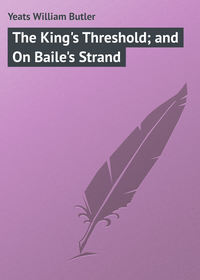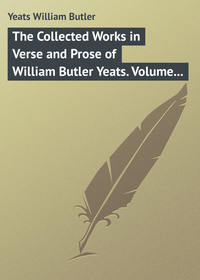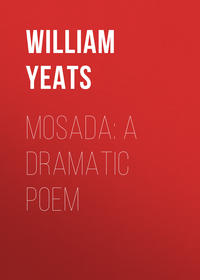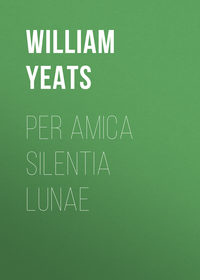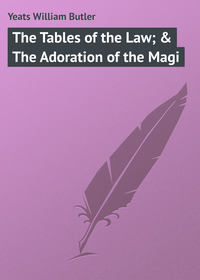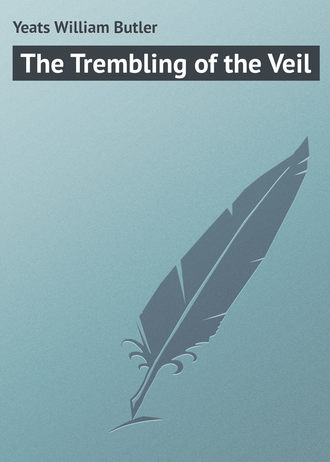 полная версия
полная версияThe Trembling of the Veil
He had few detachable phrases, and I can remember little of his speech, which many thought the best of all good talk, except that it matched his burly body and seemed within definite boundaries inexhaustible in fact and expression. He alone of all the men I have known seemed guided by some beast-like instinct and never ate strange meat. “Balzac! Balzac!” he said to me once, “oh, that was the man the French Bourgeoisie read so much a few years ago.” I can remember him at supper praising wine: “Why do people say it is prosaic to be inspired by wine? Has it not been made by the sunlight and the sap?” and his dispraising houses decorated by himself: “Do you suppose I like that kind of house? I would like a house like a big barn, where one ate in one corner, cooked in another corner, slept in the third corner, and in the fourth received one’s friends”; and his complaining of Ruskin’s objection to the underground railway: “If you must have a railway the best thing you can do with it is to put it in a tube with a cork at each end.” I remember, too, that when I asked what led up to his movement, he replied: “Oh, Ruskin and Carlyle, but somebody should have been beside Carlyle and punched his head every five minutes.” Though I remember little, I do not doubt that, had I continued going there on Sunday evenings, I should have caught fire from his words and turned my hand to some mediaeval work or other.
Just before I had ceased to go there I had sent my Wanderings of Usheen to his daughter, hoping of course that it might meet his eyes, and soon after sending it I came upon him by chance in Holborn – “You write my sort of poetry,” he said and began to praise me and to promise to send his praise to The Commonwealth, the League organ, and he would have said more had he not caught sight of a new ornamental cast-iron lamp post and got very heated upon that subject.
I did not read economics, having turned socialist because of Morris’s lectures and pamphlets, and I think it unlikely that Morris himself could read economics. That old dogma of mine seemed germane to the matter. If the men and women imagined by the poets were the norm, and if Morris had, in let us say “News from Nowhere,” then running through The Commonwealth, described such men and women, living under their natural conditions, or as they would desire to live, then those conditions themselves must be the norm and could we but get rid of certain institutions the world would turn from eccentricity. Perhaps Morris himself justified himself in his own heart by as simple an argument, and was, as the socialist D – said to me one night, walking home after some lecture, “an anarchist without knowing it.” Certainly I and all about me, including D – himself, were for chopping up the old king for Medea’s pot. Morris had told us to have nothing to do with the parliamentary socialists, represented for men in general by the Fabian Society and Hyndman’s Social Democratic Federation and for us in particular by D – . During the period of transition mistakes must be made, and the discredit of these mistakes must be left to “the Bourgeoisie”; and besides, when you begin to talk of this measure, or that other, you lose sight of the goal, and see, to reverse Swinburne’s description of Tiresias, “Light on the way but darkness on the goal.” By mistakes Morris meant vexatious restrictions and compromises – “If any man puts me into a labour squad, I will lie on my back and kick.” That phrase very much expresses our idea of revolutionary tactics: we all intended to lie upon our back and kick. D – , pale and sedentary, did not dislike labour squads and we all hated him with the left side of our heads, while admiring him immensely with the right side. He alone was invited to entertain Mrs Morris, having many tales of his Irish uncles, more especially of one particular uncle who had tried to commit suicide by shutting his head into a carpet-bag. At that time he was an obscure man, known only for a witty speaker at street corners and in Park demonstrations. He had, with an assumed truculence and fury, cold logic, an invariable gentleness, an unruffled courtesy, and yet could never close a speech without being denounced by a journeyman hatter, with an Italian name. Converted to socialism by D – , and to anarchism by himself, with swinging arm and uplifted voice, this man put, and perhaps, exaggerated our scruple about Parliament. “I lack,” said D – , “the bump of reverence”; whereon the wild man shouted: “You ’ave a ’ole.” There are moments when looking back I somewhat confuse my own figure with that of the hatter, image of our hysteria, for I too became violent with the violent solemnity of a religious devotee. I can even remember sitting behind D – and saying some rude thing or other over his shoulder.
I don’t remember why I gave it up but I did quite suddenly and the push may have come from a young workman who was educating himself between Morris and Karl Marx. He had planned a history of the Navy, and when I had spoken of the battleships of Nelson’s day had said, “O, that was the decadence of the battleship,” but if his naval interests were mediæval, his ideas about religion were pure Karl Marx, and we were soon in perpetual argument. Then gradually the attitude towards religion of almost everybody but Morris, who avoided the subject altogether, got upon my nerves, for I broke out after some lecture or other with all the arrogance of raging youth. They attacked religion, I said, or some such words, and yet there must be a change of heart and only religion could make it. What was the use of talking about some new revolution putting all things right, when the change must come, if come it did, with astronomical slowness, like the cooling of the sun, or it may have been like the drying of the moon? Morris rang his chairman’s bell, but I was too angry to listen, and he had to ring it a second time before I sat down. He said that night at supper, “Of course I know there must be a change of heart, but it will not come as slowly as all that. I rang my bell because you were not being understood.” He did not show any vexation, but I never returned after that night; and yet I did not always believe what I had said, and only gradually gave up thinking of and planning for some near sudden change for the better.
XIV
I spent my days at the British Museum and must, I think, have been delicate, for I remember often putting off hour after hour consulting some necessary book because I shrank from lifting the heavy volumes of the catalogue; and yet to save money for my afternoon coffee and roll I often walked the whole way home to Bedford Park. I was compiling, for a series of shilling books, an anthology of Irish fairy-stories and, for an American publisher, a two-volume selection from the Irish novelists that would be somewhat dearer. I was not well paid, for each book cost me more than three months’ reading; and I was paid for the first some twelve pounds (“O, Mr. E.,” said publisher to editor, “you must never again pay so much!”) and for the second twenty, but I did not think myself badly paid, for I had chosen the work for my own purposes.
Though I went to Sligo every summer, I was compelled to live out of Ireland the greater part of every year, and was but keeping my mind upon what I knew must be the subject-matter of my poetry. I believed that if Morris had set his stories amid the scenery of his own Wales, for I knew him to be of Welsh extraction and supposed wrongly that he had spent his childhood there, that if Shelley had nailed his Prometheus, or some equal symbol, upon some Welsh or Scottish rock, their art had entered more intimately, more microscopically, as it were, into our thought and had given perhaps to modern poetry a breadth and stability like that of ancient poetry. The statues of Mausolus and Artemisia at the British Museum, private, half-animal, half-divine figures, all unlike the Grecian athletes and Egyptian kings in their near neighbourhood, that stand in the middle of the crowd’s applause, or sit above measuring it out unpersuadable justice, became to me, now or later, images of an unpremeditated joyous energy, that neither I nor any other man, racked by doubt and inquiry, can achieve; and that yet, if once achieved, might seem to men and women of Connemara or of Galway their very soul. In our study of that ruined tomb raised by a queen to her dead lover, and finished by the unpaid labour of great sculptors, after her death from grief, or so runs the tale, we cannot distinguish the handiworks of Scopas and Praxiteles; and I wanted to create once more an art where the artist’s handiwork would hide as under those half anonymous chisels, or as we find it in some old Scots ballads, or in some twelfth or thirteenth century Arthurian Romance. That handiwork assured, I had martyred no man for modelling his own image upon Pallas Athena’s buckler; for I took great pleasure in certain allusions to the singer’s life, one finds in old romances and ballads, and thought his presence there all the more poignant because we discover it half lost, like portly Chaucer, behind his own maunciple and pardoner upon the Canterbury roads. Wolfram von Eschenbach, singing his German Parsifal, broke off some description of a famished city to remember that in his own house at home the very mice lacked food, and what old ballad singer was it who claimed to have fought by day in the very battle he sang by night? So masterful indeed was that instinct that when the minstrel knew not who his poet was, he must needs make up a man: “When any stranger asks who is the sweetest of singers, answer with one voice: ‘a blind man; he dwells upon rocky Chios; his songs shall be the most beautiful for ever.’” Elaborate modern psychology sounds egotistical, I thought, when it speaks in the first person, but not those simple emotions which resemble the more, the more powerful they are, everybody’s emotion, and I was soon to write many poems where an always personal emotion was woven into a general pattern of myth and symbol. When the Fenian poet says that his heart has grown cold and callous – “For thy hapless fate, dear Ireland, and sorrows of my own” – he but follows tradition and if he does not move us deeply, it is because he has no sensuous musical vocabulary that comes at need, without compelling him to sedentary toil and so driving him out from his fellows. I thought to create that sensuous, musical vocabulary, and not for myself only, but that I might leave it to later Irish poets, much as a mediæval Japanese painter left his style as an inheritance to his family, and was careful to use a traditional manner and matter, yet did something altogether different, changed by that toil, impelled by my share in Cain’s curse, by all that sterile modern complication, by my “originality,” as the newspapers call it. Morris set out to make a revolution that the persons of his Well at the World’s End or his Waters of the Wondrous Isles, always, to my mind, in the likeness of Artemisia and her man, might walk his native scenery; and I, that my native scenery might find imaginary inhabitants, half-planned a new method and a new culture. My mind began drifting vaguely towards that doctrine of “the mask” which has convinced me that every passionate man (I have nothing to do with mechanist, or philanthropist, or man whose eyes have no preference) is, as it were, linked with another age, historical or imaginary, where alone he finds images that rouse his energy. Napoleon was never of his own time, as the naturalistic writers and painters bid all men be, but had some Roman emperor’s image in his head and some condottiere blood in his heart; and when he crowned that head at Rome with his own hands he had covered, as may be seen from David’s painting, his hesitation with that emperor’s old suit.
XV
I had various women friends on whom I would call towards five o’clock mainly to discuss my thoughts that I could not bring to a man without meeting some competing thought, but partly because their tea and toast saved my pennies for the ’bus ride home; but with women, apart from their intimate exchanges of thought, I was timid and abashed. I was sitting on a seat in front of the British Museum feeding pigeons when a couple of girls sat near and began enticing my pigeons away, laughing and whispering to one another, and I looked straight in front of me, very indignant, and presently went into the Museum without turning my head towards them. Since then I have often wondered if they were pretty or merely very young. Sometimes I told myself very adventurous love-stories with myself for hero, and at other times I planned out a life of lonely austerity, and at other times mixed the ideals and planned a life of lonely austerity mitigated by periodical lapses. I had still the ambition, formed in Sligo in my teens, of living in imitation of Thoreau on Innisfree, a little island in Lough Gill, and when walking through Fleet Street very homesick I heard a little tinkle of water and saw a fountain in a shop-window which balanced a little ball upon its jet, and began to remember lake water. From the sudden remembrance came my poem Innisfree, my first lyric with anything in its rhythm of my own music. I had begun to loosen rhythm as an escape from rhetoric and from that emotion of the crowd that rhetoric brings, but I only understood vaguely and occasionally that I must for my special purpose use nothing but the common syntax. A couple of years later I would not have written that first line with its conventional archaism – “Arise and go” – nor the inversion in the last stanza. Passing another day by the new Law Courts, a building that I admired because it was Gothic – “It is not very good,” Morris had said, “but it is better than anything else they have got and so they hate it” – I grew suddenly oppressed by the great weight of stone, and thought, “There are miles and miles of stone and brick all round me,” and presently added, “If John the Baptist or his like were to come again and had his mind set upon it, he could make all these people go out into some wilderness leaving their buildings empty,” and that thought, which does not seem very valuable now, so enlightened the day that it is still vivid in the memory. I spent a few days at Oxford copying out a seventeenth century translation of Poggio’s Liber Facetiarum or the Hypneroto-machia of Poliphili for a publisher; I forget which, for I copied both; and returned very pale to my troubled family. I had lived upon bread and tea because I thought that if antiquity found locust and wild honey nutritive, my soul was strong enough to need no better. I was always planning some great gesture, putting the whole world into one scale of the balance and my soul into the other and imagining that the whole world somehow kicked the beam. More than thirty years have passed and I have seen no forcible young man of letters brave the metropolis, without some like stimulant; and all after two or three, or twelve or fifteen years, according to obstinacy, have understood that we achieve, if we do achieve, in little sedentary stitches as though we were making lace. I had one unmeasured advantage from my stimulant: I could ink my socks, that they might not show through my shoes, with a most haughty mind, imagining myself, and my torn tackle, somewhere else, in some far place “under the canopy … i’ the city of kites and crows.”
In London I saw nothing good and constantly remembered that Ruskin had said to some friend of my father’s – “As I go to my work at the British Museum I see the faces of the people become daily more corrupt.” I convinced myself for a time, that on the same journey I saw but what he saw. Certain old women’s faces filled me with horror, faces that are no longer there, or if they are pass before me unnoticed: the fat blotched faces, rising above double chins, of women who have drunk too much beer and eaten much meat. In Dublin I had often seen old women walking with erect heads and gaunt bodies, talking to themselves with loud voices, mad with drink and poverty, but they were different, they belonged to romance. Da Vinci had drawn women who looked so and so carried their bodies.
XVI
I attempted to restore one old friend of my father’s to the practice of his youth, but failed, though he, unlike my father, had not changed his belief. My father brought me to dine with Jack Nettleship at Wigmore Street, once inventor of imaginative designs and now a painter of melodramatic lions. At dinner I had talked a great deal – too much, I imagine, for so young a man, or maybe for any man – and on the way home my father, who had been plainly anxious that I should make a good impression, was very angry. He said I had talked for effect and that talking for effect was precisely what one must never do; he had always hated rhetoric and emphasis and had made me hate it; and his anger plunged me into great dejection. I called at Nettleship’s studio the next day to apologise, and Nettleship opened the door himself and received me with enthusiasm. He had explained to some woman guest that I would probably talk well, being an Irishman, but the reality had surpassed, etc., etc. I was not flattered, though relieved at not having to apologise, for I soon discovered that what he really admired was my volubility, for he himself was very silent. He seemed about sixty, had a bald head, a grey beard, and a nose, as one of my father’s friends used to say, like an opera-glass, and sipped cocoa all the afternoon and evening from an enormous tea-cup that must have been designed for him alone, not caring how cold the cocoa grew. Years before he had been thrown from his horse, while hunting, and broke his arm, and because it had been badly set suffered great pain for a long time. A little whisky would always stop the pain, and soon a little became a great deal and he found himself a drunkard, but having signed his liberty away for certain months he was completely cured. He had acquired, however, the need of some liquid which he could sip constantly. I brought him an admiration settled in early boyhood, for my father had always said, “George Wilson was our born painter, but Nettleship our genius,” and even had he shown me nothing I could care for, I had admired him still because my admiration was in my bones. He showed me his early designs, and they, though often badly drawn, fulfilled my hopes. Something of Blake they certainly did show, but had in place of Blake’s joyous, intellectual energy a Saturnian passion and melancholy. “God Creating Evil,” the death-like head with a woman and a tiger coming from the forehead, which Rossetti – or was it Browning? – had described “as the most sublime design of ancient or modern art,” had been lost, but there was another version of the same thought, and other designs never published or exhibited. They rise before me even now in meditation, especially a blind Titan-like ghost floating with groping hands above the tree-tops. I wrote a criticism, and arranged for reproductions with the editor of an art magazine, but after it was written and accepted the proprietor, lifting what I considered an obsequious caw in the Huxley, Tyndall, Carolus Duran, Bastien-Lepage rookery, insisted upon its rejection. Nettleship did not mind its rejection, saying, “Who cares for such things now? Not ten people,” but he did mind my refusal to show him what I had written. Though what I had written was all eulogy, I dreaded his judgment for it was my first art criticism. I hated his big lion pictures, where he attempted an art too much concerned with the sense of touch, with the softness or roughness, the minutely observed irregularity of surfaces, for his genius; and I think he knew it. “Rossetti used to call my pictures pot-boilers,” he said, “but they are all – all” – and he waved his arm to the canvasses – “symbols.” When I wanted him to design gods, and angels, and lost spirits once more, he always came back to the point “Nobody would be pleased.” “Everybody should have a raison d’être” was one of his phrases. “Mrs – ’s articles are not good but they are her raison d’être.” I had but little knowledge of art for there was little scholarship in the Dublin art school, so I overrated the quality of anything that could be connected with my general beliefs about the world. If I had been able to give angelical or diabolical names to his lions I might have liked them also and I think that Nettleship himself would have liked them better and liking them better have become a better painter. We had the same kind of religious feeling, but I could give a crude philosophical expression to mine while he could only express his in action or with brush and pencil. He often told me of certain ascetic ambitions, very much like my own, for he had kept all the moral ambition of youth, as for instance – “Yeats, the other night I was arrested by a policeman – was walking round Regent’s Park barefooted to keep the flesh under – good sort of thing to do. I was carrying my boots in my hand and he thought I was a burglar and even when I explained and gave him half a crown, he would not let me go till I had promised to put on my boots before I met the next policeman.”
He was very proud and shy and I could not imagine anybody asking him questions and so I was content to take these stories as they came: confirmations of what I had heard of him in boyhood. One story in particular had stirred my imagination for, ashamed all my boyhood of my lack of physical courage, I admired what was beyond my imitation. He thought that any weakness, even a weakness of body, had the character of sin and while at breakfast with his brother, with whom he shared a room on the third floor of a corner house, he said that his nerves were out of order. Presently he left the table, and got out through the window and on to a stone ledge that ran along the wall under the windowsills. He sidled along the ledge, and turning the corner with it, got in at a different window and returned to the table. “My nerves,” he said, “are better than I thought.”
Nettleship said to me: “Has Edwin Ellis ever said anything about the effect of drink upon my genius?” “No,” I answered. “I ask,” he said, “because I have always thought that Ellis has some strange medical insight.” Though I had answered no, Ellis had only a few days before used these words: “Nettleship drank his genius away.” Ellis, but lately returned from Perugia where he had lived many years, was another old friend of my father’s but some years younger than Nettleship or my father. Nettleship had found his simplifying image, but in his painting had turned away from it, while Ellis, the son of Alexander Ellis, a once famous man of science, who was perhaps the last man in England to run the circle of the sciences without superficiality, had never found that image at all. He was a painter and poet, but his painting, which did not interest me, showed no influence but that of Leighton. He had started perhaps a couple of years too late for Pre-Raphaelite influence, for no great Pre-Raphaelite picture was painted after 1870, and left England too soon for that of the French painters. He was, however, sometimes moving as a poet and still more often an astonishment. I have known him cast something just said into a dozen lines of musical verse, without apparently ceasing to talk; but the work once done he could not or would not amend it, and my father thought he lacked all ambition. Yet he had at times nobility of rhythm – an instinct for grandeur, and after thirty years I still repeat to myself his address to Mother Earth —
“O mother of the hills, forgive our towers,O mother of the clouds forgive our dreams.”And there are certain whole poems that I read from time to time or try to make others read. There is that poem where the manner is unworthy of the matter, being loose and facile, describing Adam and Eve fleeing from Paradise. Adam asks Eve what she carries so carefully, and Eve replies that it is a little of the apple-core kept for their children. There is that vision concerning Christ the Less, a too hurriedly written ballad, where the half of Christ sacrificed to the divine half “that fled to seek felicity” wanders wailing through Golgotha, and there is The Saint and the Youth, in which I can discover no fault at all. He loved complexities – “Seven silences like candles round her face” is a line of his – and whether he wrote well or ill had always a manner which I would have known from that of any other poet. He would say to me, “I am a mathematician with the mathematics left out” – his father was a great mathematician – or “A woman once said to me, ‘Mr Ellis, why are your poems like sums?’” And certainly he loved symbols and abstractions. He said once, when I had asked him not to mention something or other, “Surely you have discovered by this time that I know of no means whereby I can mention a fact in conversation.”




